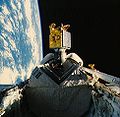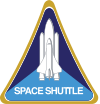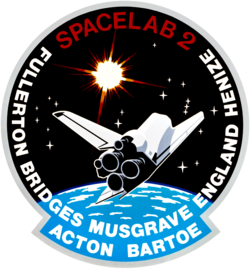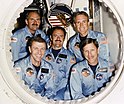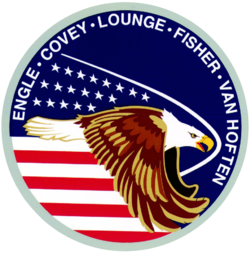STS-51-I
| Missionsemblem | |||||
|---|---|---|---|---|---|
 | |||||
| Missionsstatistik | |||||
| Missionsnavn: | STS-51-I | ||||
| Rumagentur: | NASA | ||||
| Rumfærge: | Discovery (6) | ||||
| Antal besætningsmedlemmer: | 5 | ||||
| Affyringsrampe: | LC-39A (KSC) | ||||
| Opsendelse: | 27. august 1985 | ||||
| Landing: | 3. september 1985 | ||||
| Landet på: | Edwards Air Force Base | ||||
| Varighed: | 7 dage, 2 timer | ||||
| Foto af besætningen | |||||
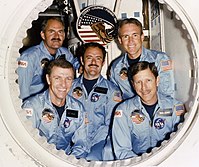 | |||||
| Navigation | |||||
| |||||
STS-51-I (Space Transportation System-STS-51-I) var rumfærgen Discoverys 6. rumfærgeflyvning. Opsendt 27. august 1985 og vendte tilbage den 3. september 1985.
Hovedformålet var at sætte kommunikationssatellitterne ASC-1, AUSSAT-1 og SYNCOM IV-4/LEASAT-4) i kredsløb, den sidste mislykkedes.
Besætning

 Joseph Engle (kaptajn)
Joseph Engle (kaptajn)
 Richard Covey (pilot)
Richard Covey (pilot)
 James van Hoften (1. missionsspecialist)
James van Hoften (1. missionsspecialist)
 John Lounge (2. missionsspecialist)
John Lounge (2. missionsspecialist)
 William Fisher (3. missionsspecialist)
William Fisher (3. missionsspecialist)
Missionen
Hovedartikler:
| Wikimedia Commons har medier relateret til: |
Eksterne henvisninger
- STS-51-I NASA (engelsk)
| ||||||||
| ||||||||||||||||||||
Medier brugt på denne side
SVG version of PNG Space Shuttle Logo/Patch.
STS-51F Mission Insignia
- The crewmembers of Space Shuttle mission 51-F have chosen as their insignia this design by Houston artist Skip Bradley. The Space Shuttle Challenger is depicted ascending toward the heavens in search of new knowledge in the field of solar and stellar astronomy, with its Spacelab 2 payload. The constellations Leo and Orion are in the positions they will be in, relative to the sun during the flight. The nineteen stars signify that this will be the 19th STS flight. Crewmembers for the mission are Astronauts C. Gordon Fullerton, commander; Roy D. Bridges, pilot; F. Story Musgrave, Anthony W. England, and Karl J. Henize, mission specialist; and Payload Specialists Loren W. Acton and John David Bartoe.
View of the ASC-1 satellite after deployment on STS-51-I.
The American Satellite Company (ASC) communications satellite is deployed from the payload bay of the Shuttle Discovery. A portion of the cloudy surface of the earth can be seen to the left of the frame.
View of the AUSSAT-1 satellite after deployment on STS-51-I.
Australia's AUSSAT communications satellite is deployed from the payload bay of the Shuttle Discovery. A portion of the cloudy surface of the earth can be seen to the left of the frame.
The crew assigned to the STS-51I mission included (front row left to right) Joe H. Engle, commander; and Richard O. Covey, pilot. In the center is John M. (Mike) Lounge, mission specialist. On the back row, from left to right, are mission specialists James D. van Hoften, and William F. Fisher. Launched aboard the Space Shuttle Discovery on August 27, 1985 at 6:58:01 am (EDT), the STS-51I mission's primary payloads were three communication satellites: the ASC-1 for the American Satellite Company; the AUSSAT-1, an Australian communications satellite; and the SYNCOM-IV-4, the synchronous communications satellite.
STS-51-J Mission Insignia
View of the Syncom IV-4 satellite after deployment on STS-51-I.
The Syncom IV-4 communications satellite is deployed from the payload bay of the Shuttle Discovery in a frisbee fashion. A portion of the cloudy surface of the earth can be seen to the left of the frame.
Forfatter/Opretter: Rei-artur (diskussion · bidrag), reshaped by F l a n k e r (talk), Licens: CC-BY-SA-3.0
symbol of Mars. 400 × 400 pixels nominal dimensions, line 45 pixel tick, circle 295 × 295 pixel, not joined with arrow. Colour: red=0 green=0 blue=140.
![]() Vektorgrafikken blev lavet med Inkscape.
Vektorgrafikken blev lavet med Inkscape.
Rotated and color enhanced version of original (ISS013-E-48788 (6 July 2006) --- The Space Shuttle Discovery approaches the International Space Station for docking but before the link-up occurred, the orbiter "posed" for a thorough series of inspection photos. Leonardo Multipurpose Logistics Module can be seen in the shuttle's cargo bay. Discovery docked at the station's Pressurized Mating Adapter 2 at 9:52 a.m. CDT, July 6, 2006.)



